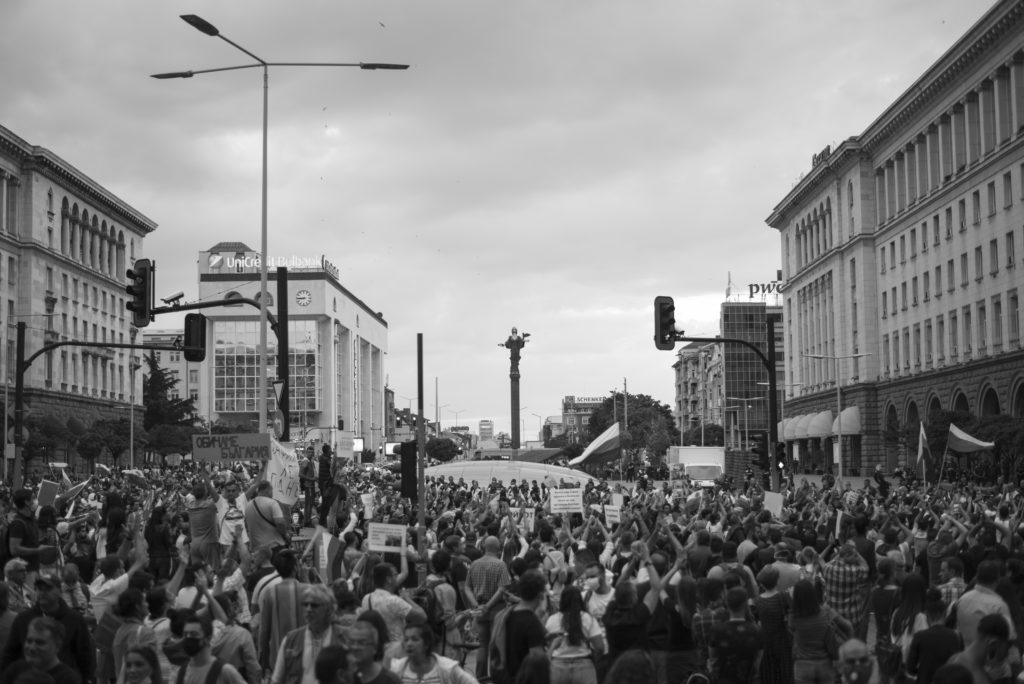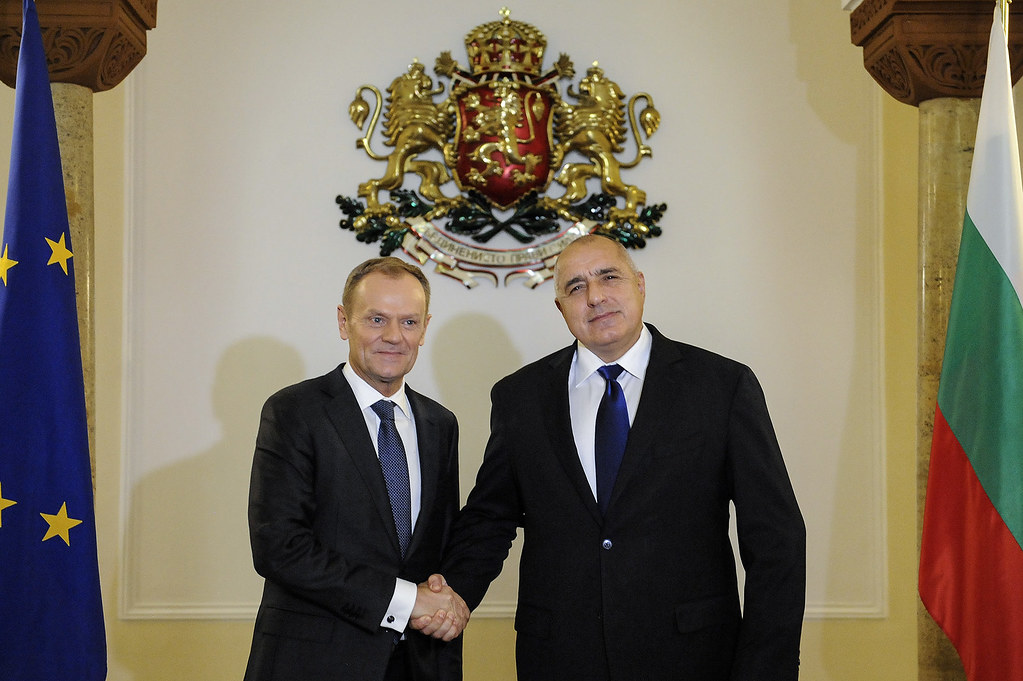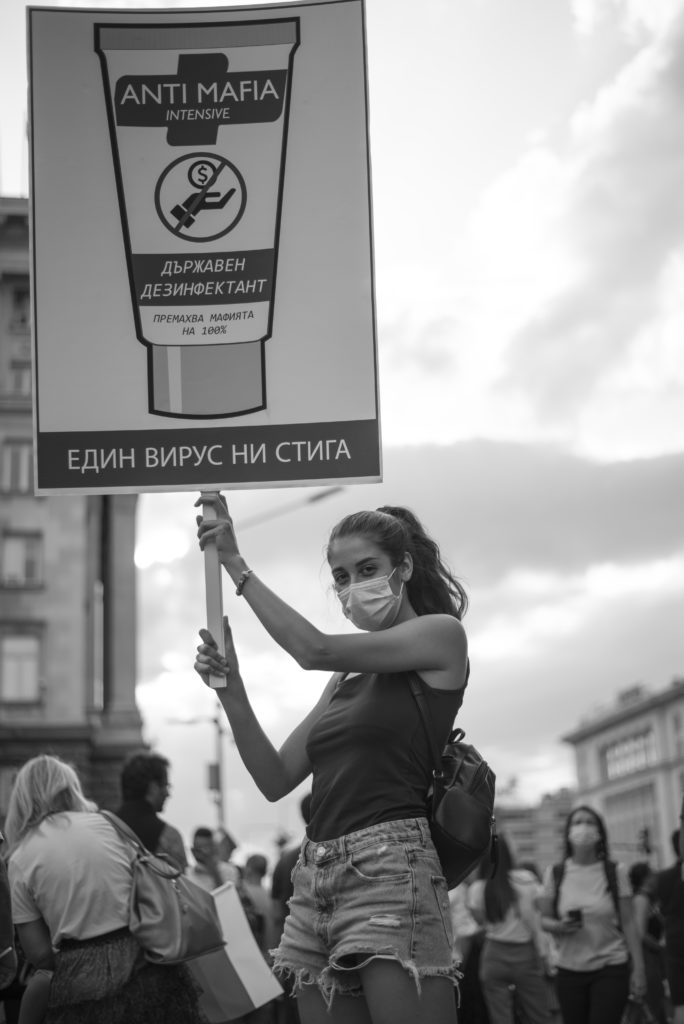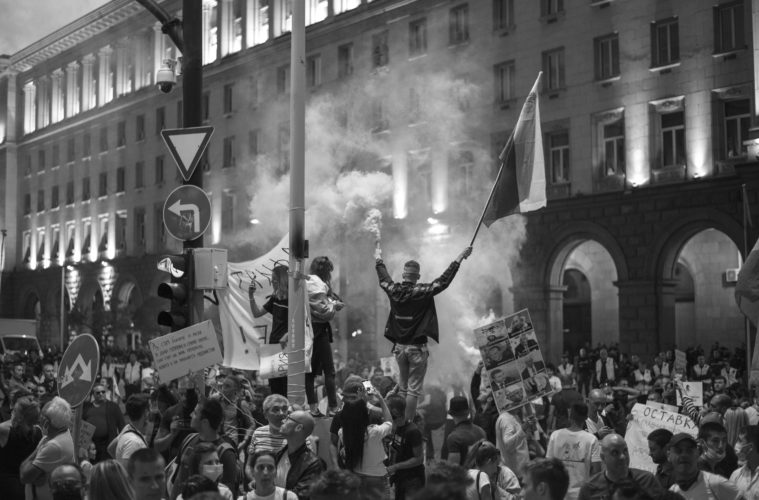“I want to want to live in Bulgaria!”
“I want my country back!”
“I think, therefore I protest,” chant crowds of Bulgarians every evening since July 9, 2020. Against the backdrop of mass anti-government protests in Belarus, Bulgaria, too, (the poorest and most corrupt country in the European Union) is shaken by a political crisis. Tired of the “dictatorship of the mafia,” protesters demand the restoration of the rule of law and basic civil freedoms, and the resignation of Prime Minister Boyko Borissov and Prosecutor-General Ivan Geshev.
The targets of this public outpouring of anger are the corrupt political elite and its instrumentalized judiciary power. The faces of the protests are diverse. Young students waving European flags, mothers asking for social assistance for their handicapped children, and elderly people calling for better pensions. Although supported by the President and most opposition parties, who try to take advantage of the situation, the protests have no particular political affiliation. From the city center of the capital, Sofia, demonstrations spread rapidly across the country and pervaded Bulgarian communities worldwide.

Photo: Martin Rusenov
Origins of the movement
The movement took off after the revelation of a corruption scandal involving Ahmed Dogan, the former chairman of the ethnic Turkish Movement for Rights and Freedoms party (DPS) and one of Bulgaria’s behind-the-scenes powerbrokers. A live stream on Facebook exposed the illegal privatization, enforced by state security agents, of a public beach for the construction of Dogan’s seaside villa. After a lack of reaction from the Prosecutor-General’s office, the left-wing President Rumen Radev made a statement confirming that Dogan is benefiting from the unentitled protection of the State Security Agency, along with his ally Delyan Peevski, an oligarch and DPS deputy. In what was seen as an act of revenge, representatives of Prosecutor-General Ivan Geshev entered the presidency and publicly arrested two members of the presidential administration.
But these events were just the final straw. Bulgarians have been frustrated with deep-seated corruption in their country for the long time. The Eurobarometer survey shows that 85% of Bulgarians think corruption is widespread, and 71% have no trust in the current government. Bulgaria occupies the 111th position in the World Press Freedom Index and was repeatedly criticized in the EU Rule of Law Report for the lack of transparency of media ownership and for insufficient judiciary independence. This is why protesters blame not only Prime Minister Borissov and his government for the degrading situation, but also seen-to-be allies like Prosecutor-General Geshev, media tycoon Peevski, and ex-communist secret services agent Dogan.
Birth of the ‘dictatorship of the mafia’
Today’s mafia in Bulgaria originates from communist-era security agencies, sports clubs, and prisons. In the 1990s, Bulgaria experienced a series of gangster wars and became notorious for its organized crime system and smuggling channels for weapons. It was precisely in this period of post-communist transition that today’s political elite was formed. Benefiting from protection rackets, the present Bulgarian oligarchs took part in the privatization of state property and were allowed to create legal businesses that have since turned into influential empires with far-reaching political links. Their companies are rewarded with public contracts without official public procurement auctions, in exchange for loyal support to the government.
All political figures targeted by the protests played an active role during this period. Take Prime Minister Borissov (in power since 2009), for instance, who was a karate champion and bodyguard of former communist dictator Todor Zhivkov. Borissov presents himself as a corruption-buster, but is potentially tied to organized-crime groups operating through insurance and security companies himself. He is confident about his re-election at the parliamentary elections in March 2021, and claims that he and his party (GERB) are Bulgaria’s only way towards prosperity. Borissov even turned up this rhetoric during the protests. In a video on his Facebook page he said:
“The mafia wants to overthrow the government and this is a reason not to resign. (…) Thousands of people write to me every day and beg me not to leave them because they see what is coming and how evil and arrogant they are.’’

“Visit of Donald Tusk the President of the European Council for the Inaugural ceremony
for the Bulgarian Presidency of the Council of the EU on January 11, 2018 in Sofia, Bulgaria.”
by europeancouncilpresident is licensed under CC BY-NC-ND 2.0
National and European responses
The last four months Bulgarians have unambiguously shown that they are tired of living in a “captured state” where public institutions are highly politicized and clientelism is widespread. They seem to be unsatisfied with the response to their demands. Prime Minister Borissov has refused to resign, saying that the country cannot afford a political crisis on top of the ongoing pandemic-induced economic one. Instead, he replaced some key ministers in his government and proposed a new constitution (without having consulted with the opposition or civil society). The proposition includes cutting the number of MPs in the Parliament by half and a shortening of the Prosecutor-General’s mandate. Protesters see the constitutional changes as insignificant and an attempt to pull the wool over their eyes until the 2021 election.
Disappointed by a lack of reaction from the EU, demonstrators took to the Representation of the European Commission in Sofia and the buildings of the European institutions in Brussels. Their slogan was “EU are you blind?”
This phrase became even more pertinent as Manfred Weber, leader of the European People’s Party (EPP) that Borissov’s GERB party is a member of, stated in July that “the EPP group fully supports the Bulgarian government of Boyko Borissov and its efforts to protect the economy against the negative effects of the corona crisis, fight against corruption and the progress that is being made to join the Eurozone.”
This did not discourage protesters from perceiving the EU as a way to bring Bulgarian society closer to Western European welfare levels. Banners asking the EU why it overlooked the failure of democratic institutions in Bulgaria led to a discussion in the European Parliament on rule of law in the country. The EPP continued defending Borissov’s efforts to fight corruption and pave the way for Bulgaria’s admission to the Eurozone. Deputies coming from other political families strongly criticized Borissov and compared Bulgaria’s situation to the one in Poland and Hungary. They especially condemned Bulgarian frauds with European funds. A resolution showing solidarity with the “demands and aspirations for justice, transparency, accountability and democracy” of the people of Bulgaria was adopted in September, a significant legitimization of the protest movement.
Current state of affairs
Up until early November, protesters attended the “great national uprising” undeterred by the Covid-19 pandemic. But due to a recent increase in Covid-19 cases in Bulgaria, the protests have changed form. Only a small number of people gather every evening in the streets, while many others participate in socially-distanced initiatives like leaving old shoes in front of Parliament as a symbol of all Bulgarians who emigrated to pursue a better life abroad.

A girl protesting with the slogan “Anti-mafia disinfection. One virus is enough.”
Photo: Martin Rusenov
Past November 10, on the 31st anniversary of Bulgaria’s transition to democracy, protest organisations sent clear messages: They want “a change rather than a replacement” and they are there to finish the fight for democracy that began in 1989. Opinion polls show that more than 60% of Bulgarians support the anti-government protests, but also that 39% are skeptical about the current government’s resignation. While the past four months of protests may not have achieved the expected results of snap elections, they quite clearly show something more important: the Bulgarian people are ready for a change, and willing to take action to achieve it.

